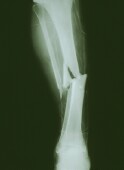
FRIDAY, Jan. 1 (HealthDay News) — When diet and exercise attempts haven’t worked, increasing numbers of overweight people have turned to bariatric, or weight-loss, surgery to shed pounds.
But research reported in 2009 pointed to an unintended result: One of every five people who had bariatric surgery had broken a bone within a few years.
Were the breaks a result of the surgery? Or of the weight loss that followed? Might they have been related to something going on in the body, either before or after the surgery? Or might something else altogether have been at work?
The answers remain unclear.
The finding came from an early analysis of data from a study by researchers from the Mayo Clinic, in Rochester, Minn. The study included 97 people, most middle-age and mostly women. All had had bariatric surgery — either stapling of the stomach, called gastric bypass, or stomach banding, called gastric band surgery. In the next seven years, 21 of them had 31 fractures.
The researchers compared the fracture rate for the people in the study with the rate for residents of Olmsted County, Minn., and found that people who had undergone weight-loss surgery were nearly twice as likely to have broken a bone for the first time as were those in the general population. The rate for specific sites was higher, with the risk for fracturing a foot, for instance, nearly four times higher among people who’d had bariatric surgery than in the general population.
The researchers did not determine what caused the increase in broken limbs. Their research, presented at a meeting in June of the Endocrine Society, continues and, through a Mayo Clinic spokesman, they declined further comment.
Until more findings are in, experts can only speculate about the cause and advise people who have had or plan to have bariatric surgery to pay close attention to bone health.
Dr. John Wilder Baker, director of the medical weight-loss program and co-director for the bariatric surgery program at Baptist Health in Little Rock, Ark., said that people in the study might have been deficient in vitamin D before the surgery.
Many people don’t include enough dairy products in their diet and so are lacking in vitamin D and calcium, both important for bone strength, said Baker, who is also president of the American Society for Metabolic and Bariatric Surgery and was familiar with the Mayo research.
Weight-loss surgery, he said, could bring about changes in absorption of calcium. “With gastric bypass, there could be some malabsorption of calcium,” he said.
“Before and after gastric bypass, patients are routinely told to take at least 1,200 milligrams of calcium daily, and usually 800 milligrams of D, but that may not be enough,” Baker said.
Monitoring patients closely is crucial, he said. “No matter which surgery [of several bariatric surgery options] they have had done, they need to be monitored for calcium, vitamin D levels and parathyroid hormones long term,” he said. Parathyroid hormones help increase calcium levels in the blood.
An orthopedic surgeon also familiar with the study said that it’s important to remember that the research was reported at a preliminary stage.
“I would be very careful drawing too much from one study,” said Dr. Leon Benson, a professor of orthopedic surgery at the University of Chicago, a hand surgery consultant at the Illinois Bone and Joint Institute and a spokesman for the American Academy of Orthopaedic Surgeons.
Benson said he has not noticed an increase in fracture patients with a history of bariatric surgery.
As for the mechanism, he speculated, like Baker, that the higher fracture rate could be linked to absorption issues.
Another possibility? “Maybe the patients lost enough weight [that] it changes body image and they have balance issues,” Benson said.
For now, people who’ve had bariatric surgery “should be as careful as they can to avoid preventable fractures,” he said. “That means paying close attention to their physician’s advice about their intake of calcium and vitamin D as well as their advice about exercise, which can help keep bones strong.”
More information
The American Academy of Orthopaedic Surgeons has more about fractures.

